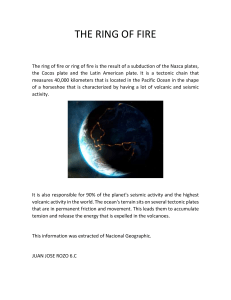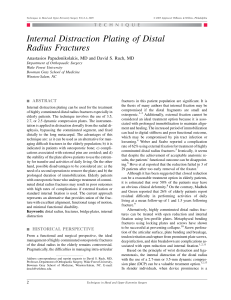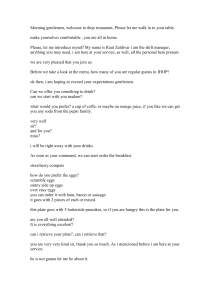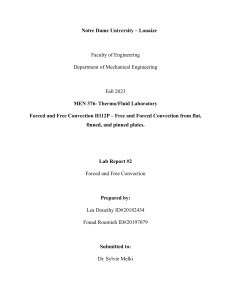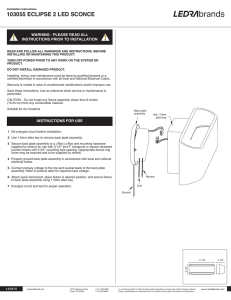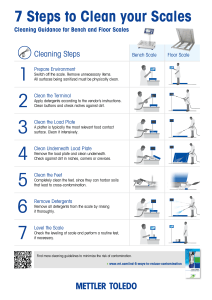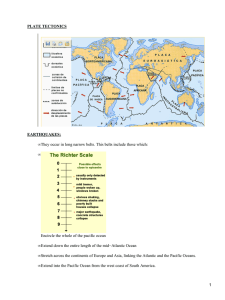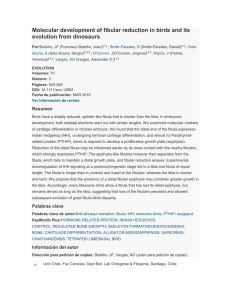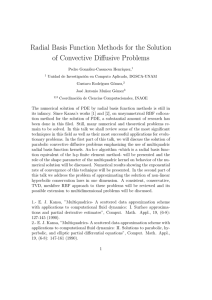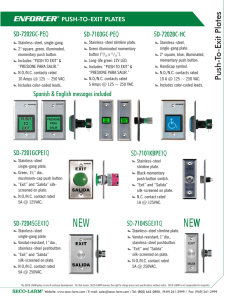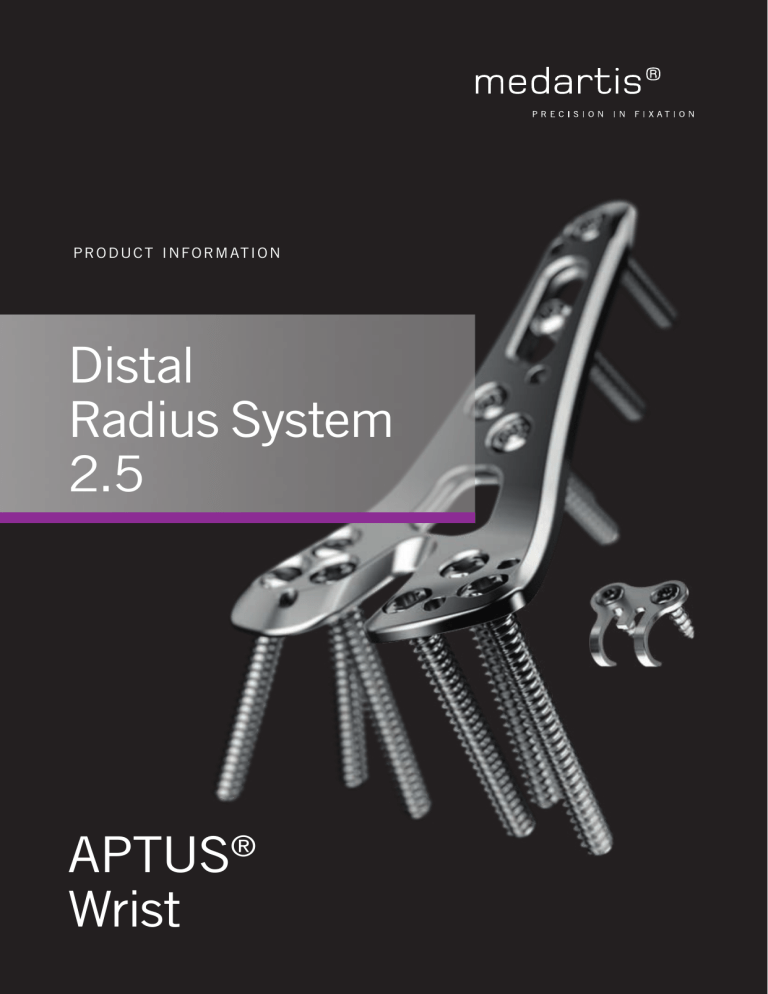
P R O D U C T IN F O RM AT I O N Distal Radius System 2.5 APTUS® Wrist 2 | Distal Radius System 2.5 Contents 3 A New Generation of Radius Plates 4 One System for Primary and Secondary Reconstruction 6 ADAPTIVE II Distal Radius Plates 8 FPL Plates 10 Hook Plates 11 Lunate Facet Plates 12 Rim Plates 13 Fracture Plates 14 Correction Plates 15 Volar Frame Plates 16 Extra-Articular Plates 17 Small Fragment Plates 18 Dorsal Frame Plates 19 XL Plates 20 Distal Ulna Plates 21 Fracture Treatment Concept 22 Technology, Biomechanics, Screw Features 24 Precisely Guided Screw Placement 25 Instrument for Reconstruction of the Volar Tilt 26 Storage 27 Overview Screw Trajectories 29 Ordering Information 47 Bibliography For further information regarding the APTUS product line visit: www.medartis.com Medartis, APTUS, MODUS, TriLock, HexaDrive and SpeedTip are registered trademarks of Medartis AG / Medartis Holding AG, 4057 Basel, Switzerland www.medartis.com Distal Radius System 2.5 | 3 A New Generation of Radius Plates Why is a new generation of radius plates needed? Distal radius fractures are the most common fractures of the stable plate systems have enabled open reduction and inter- upper extremities. The knowledge of these fractures has grown nal fixation to become an established treatment method for enormously over the last years. Treatment concepts have like- intra- and extra-articular distal radius fractures. These sys- wise been refined. It is now generally accepted that the best tems have enabled even severe extension fractures with dor- possible anatomical reconstruction of the radiocarpal joint sal defect zones to be precisely repositioned and treated with (RCJ) and distal radioulnar joint (DRUJ) to produce a func- osteosynthesis via volar access without the need for additional tional outcome is a requirement. Multidirectional and angular cortico-cancellous bone graft. Can an established system be further improved? The literature shows that differentiating treatment strategies, effect on the joint geometry with a resultant restriction in wrist taking into consideration different fracture types and modern mobility, reduction in the grip force, and development of pain implants, are able to lower the rate of complications and signi- and possible early osteoarthritis. ficantly improve functional outcomes . Complications such In collaboration with internationally renowned specialists, as irritations and ruptures of the flexor tendons and exten- Medartis has refined its established APTUS radius portfolio to sor tendons are still described in the literature, however lower the rates of these complications. 1–8 . 10 – 20 These complications are caused by a prominent distal plate design or a plate position that is too distal, for example. Healing of a distal radius fracture in an incorrect position is another common complication. This has a longterm negative www.medartis.com 4 | Distal Radius System 2.5 One System for Primary and Secondary Reconstruction Complete system for fracture-specific treatment ADAPTIVE volar radius plates for very distal Hook plates for the treatment of very small distal rim placement and for support of the lunate facet and the fragments and bony ligament avulsions. DRUJ. A selection of different widths and lengths to meet different anatomical requirements. FPL plates for stabilization of the Classic styloid-oriented volar plates for Volar correction plates indicated for sigmoid notch, the lunate facet and the treatment of extension fractures correction osteotomies and extension improved radial support. The unique that extend towards the radial styloid. fractures with radial defect. plate design enables a very distal plate position considering the flexor pollicis longus tendon. www.medartis.com Distal Radius System 2.5 Specific small fragment plates for dorsal, Lunate facet and rim plates for support of volar and radial fixation. volar rim fractures. Dorsal plates for fractures that cannot be XL plates for fixation of combined addressed with a volar plate. diaphyseal-metaphyseal radius fractures. | 5 www.medartis.com 6 | Distal Radius System 2.5 ADAPTIVE II Distal Radius Plates Support of the lunate facet and the DRUJ Clinical Benefits ADAPTIVE II Watershed line design • Improved anatomical fit * • Stabilization of the sigmoid notch and lunate facet • Treatment of fractures with ulnar fragments • Three different widths to meet individual anatomical requirements • Window enables viewing of the fracture position 19 mm Narrow 23 mm Standard 26 mm Wide Subchondral buttressing of the RCJ and DRUJ due to the possibility of converging screw placement * Evaluated on 250 cadaver bones ** Clinical case published with the kind permission of: Bernard Schick, Sydney, Australia www.medartis.com Female. 77 years. Simple intra-articular fracture ** Distal Radius System 2.5 | 7 Specific Plate Features Second distal screw row provides stabilization of the dorsal rim First distal screw row for support of the central aspect of the radio carpal joint Chamfered distal plate edge Improved anatomical fit adapted to the volar aspect of the distal radius Plate Features • TriLock – variable angle of ± 15° in all directions in each screw hole * • Pre-angled TriLock holes for oriented screw placement specially for the radial styloid • Oblong hole for variable positioning of the plate • Radiolucent drill guide block available for rapid and easy angulation of screws • K-wire holes to assist with temporary plate fixation • Rounded edges and a smooth surface for soft tissue protection * Exception: oblong hole www.medartis.com 8 | Distal Radius System 2.5 FPL Plates Support of the lunate facet, the DRUJ and the radial styloid Flexor tendon injury is a recognized complication after open xor pollicis longus (FPL) tendon travels in the distal radial reduction and internal fixation with volar locking plates of di- metaphysis over the watershed line between the scaphoid and stal radius fractures 10 – 20. A major contributing factor to these lunate facets. The placement of a volar plate distal to the tendon problems is reported to be plate prominence in the watershed line especially in this aspect is therefore a potential region of the watershed line where the flexor tendons are in di- cause of FPL tendon injury, as the transverse distal edge of rect contact with the bone, hence metal protruding this aspect the plate, when placed too distally, would be in direct contact would inflict immediate irritation of these structures. The fle- with the FPL tendon. Clinical Benefits • Improved anatomical fit * • Stabilization of the sigmoid notch, the lunate facet and improved radial support • Very distal plate positioning possible Position of the FPL tendon * Evaluated on 250 cadaver bones www.medartis.com • Y-shape with a central recess may minimize the contact pressure on the flexor pollicis longus tendon • Window enables viewing of the fracture position Distal Radius System 2.5 | 9 Specific Plate Features Longitudinal section along the axis of the FPL tendon Radial extension Chamfered FPL tendon distal plate Musculus pronator quadratus edge Recess may minimize the contact pressure FPL Plate on the flexor pollicis longus tendon Plate positioning of an ADAPTIVE II plate in comparison ADAPTIVE II Plate Improved anatomical fit adapted to the volar aspect of the distal radius * Radial Ulnar Correction Plate Plate Features • TriLock – variable angle of ± 15° in all directions in each screw hole ** • Radiolucent drill guide block available for rapid and easy angulation of screws • Pre-angled TriLock holes for oriented screw placement specially for the radial styloid • First distal screw row for support of the central aspect of the radio carpal joint • Rounded edges and a smooth surface for soft tissue protection • Second distal screw row provides stabilization of the dorsal rim • Oblong hole for variable plate positioning • K-wire holes to assist with temporary plate fixation ** Exception: oblong hole www.medartis.com 10 | Distal Radius System 2.5 Hook Plates For treatment of small, very distal fracture fragments or bony ligament avulsions respectively Small fracture fragments that are distal to the watershed line fixate these avulsed fragments would lead to flexor tendon represent a clinical challenge. A conventional volar distal irritations and screws for capturing these fragments would be radius plate which is placed distally of the watershed line to too large. Clinical Benefits • Hook plate design to fixate rim fragments and bony ligament avulsions • Hook plates can be used as stand-alone implant or underneath a volar plate depending on the fracture pattern • Two different widths and lengths to meet individual anatomical requirements Plate Features • Low plate profile (0.6 mm) and non-protruding screw heads for soft tissue protection • Self drilling 1.5 SpeedTip screws for fast and easy insertion 1.5 SpeedTip Preoperative X-ray www.medartis.com Hook plate, 2 holes Hook plate, 4 holes Hook plate, 6 holes Intraoperative view after fixation of screws Hook plate, 12 holes Postoperative X-ray control Distal Radius System 2.5 | 11 Lunate Facet Plates Treatment of isolated, volar rim fragments or bony ligament avulsions respectively Clinical Benefits • Combination of hook and TriLock plate for fixation of isolated, ulnar-sided rim fragments • Stabilization of the sigmoid notch and the lunate facet • Distal suture holes for additional soft tissue fixation • Chamfered distal plate edge for minimal implant protrusion • Low plate profile of 1.6 mm Plate Features • Hook thickness of 0.6 mm • TriLock – variable angle of ± 15° in all directions in each screw hole * • Rounded edges and a smooth surface for soft tissue protection • Oblong hole for variable positioning of the plate • K-wire holes to assist with temporary plate fixation Preoperative X-ray Intraoperative view of plate position Postoperative X-ray control with anatomical reconstruction Clinical case published with the kind permission of: J. Grünert, St. Gallen, Switzerland * Exception: oblong hole www.medartis.com 12 | Distal Radius System 2.5 Rim Plates Treatment of complex, intra-articular fractures with volar rim fragments Clinical Benefits • Bendable distal flaps – For support and fixation of volar rim fragments or bony ligament avulsions respectively – Can be used for the insertion of 1.5 SpeedTip screws or as suture holes for additional soft tissue fixation • Anatomically pre-contoured plate design • Improved anatomical fit* • Low plate profile of 1.8 mm • First distal screw row for support of the central aspect of the radiocarpal joint • Second distal screw row provides stabilization of the dorsal rim Plate Features • Flap thickness of 0.6 mm, flaps can be bent up to 35° • TriLock – multidirectional angular stability of ± 15° in all directions in each screw hole ** • Rounded edges and a smooth surface for soft tissue protection • Oblong hole for variable positioning of the plate • Radiolucent drill guide block available for rapid and easy angulation of screws • K-wire holes to assist with temporary plate fixation Preoperative CT scan * Evaluated on 250 cadaver bones * * Exception: oblong hole and flaps www.medartis.com Intraoperative view of the fracture fixation Distal Radius System 2.5 | 13 Fracture Plates Support of extension fractures with involvement of the radial styloid Clinical Benefits • Low plate profile of 1.6 mm • First distal row can be bent individually to match the anatomy • Window enables viewing of the fracture position Plate Features • TriLock – variable angle of ± 15° in all directions in each screw hole * • Buttressing of the RCJ and DRUJ due to the possibility of converging screw placement • Rounded edges and a smooth surface for soft tissue protection • Oblong hole for variable plate positioning • K-wire holes to assist with temporary plate fixation Trauma case of a C3 fracture in a 47-year old male patient Intraoperative view of the plate position Postoperative X-ray control with anatomical reconstruction and subchondral screw position Clinical case published with the kind permission of: Prof. H. Krimmer, Ravensburg, Germany * Exception: oblong hole www.medartis.com 14 | Distal Radius System 2.5 Correction Plates Correction of incongruencies both in length and angle Clinical Benefits • Low plate profile of 1.6 mm • Applicable also for complex radius reconstructions • Fixation of transplant possible • Distal plate edge for simplified finding and adjusting the ulnar inclination angle • Support of extension fractures with involvement of the radial styloid Plate Features • TriLock – variable angle of ± 15° in all directions in each screw hole * • Buttressing of the RCJ and DRUJ due to the possibility of converging screw placement • Rounded edges and a smooth surface for soft tissue protection • Oblong hole for correction of the length or variable plate positioning • K-wire holes to assist with temporary plate fixation Preoperative X-ray (lateral) with moderate malpositioning Intraoperative view after fixation of distal screws Clinical case published with the kind permission of: H. Krimmer, Ravensburg, Germany * Exception: oblong hole www.medartis.com Postoperative X-ray (lateral) after healing of correction osteotomy Distal Radius System 2.5 | 15 Volar Frame Plates Compact plate design for short incisions Clinical Benefits • Low plate profile of 1.6 mm • Frame design allows for individual adaptation to anatomy • Double shaft design provides high rotational stability • Support of extension fractures with involvement of the radial styloid Plate Features • TriLock – variable angle of ± 15° in all directions in each screw hole * • Buttressing of the RCJ and DRUJ due to the possibility of converging screw placement • Rounded edges and a smooth surface for soft tissue protection • Oblong hole for variable plate positioning • Frame design enables screw placement in the radial as well as the ulnar margin for an even better purchase Frame design Trauma case of a C3 fracture in a 68-year old female patient Intraoperative view of positioning the plate as far distal as possible X-ray control 4 weeks postoperatively Clinical case published with the kind permission of: Ch. Ranft, Kiel, Germany * Exception: oblong hole www.medartis.com 16 | Distal Radius System 2.5 Extra-Articular Plates Fixation of extra-articular distal radius fractures Clinical Benefits • Plate profile of 2.0 mm • Support of extension fractures with involvement of the radial styloid Plate Features • TriLock – variable angle of ± 15° in all directions in each screw hole * • Buttressing of the RCJ and DRUJ due to the possibility of converging screw placement • Rounded edges and a smooth surface for soft tissue protection • Oblong hole for variable plate positioning • K-wire holes to assist with temporary plate fixation Postoperative X-rays * Exception: oblong hole www.medartis.com Distal Radius System 2.5 | 17 Small Fragment Plates For fracture-specific fixation of isolated simple to complex intra-articular distal radius fractures Clinical Benefits • Low plate profile of 1.6 mm • Anatomical plate design, easily contourable to provide the desired fit • Small fragment plates in L, T and straight design to address individual fracture patterns and anatomies • Internal fixation of the intermediate and radial column according to the 3 column concept Dorsal plate Plate Features • TriLock – variable angle of ± 15° in all directions in each screw hole * Radial plate • Rounded edges and a smooth surface for soft tissue protection Anatomically pre-contoured radial plate • Oblong hole for variable plate positioning • K-wire holes to assist with temporary plate fixation Anatomically pre-contoured volar L plate * Exception: oblong hole www.medartis.com 18 | Distal Radius System 2.5 Dorsal Frame Plates Fixation of complex fractures of the distal radius Clinical Benefits • Low plate profile of 1.6 mm • Multiple screw holes offer a high degree of intra-operative flexibility • Anatomical plate design, easily contourable to provide the desired fit Plate Features • TriLock – variable angle of ± 15° in all directions in each screw hole * • Oblong holes for variable plate positioning • Buttressing of the RCJ and DRUJ due to the possibility of converging screw placement • Rounded edges and a smooth surface for soft tissue protection • Offset screw holes in the shafts avoid screw collisions Clinical picture (lateral X-ray of fracture) of a 73-year old female patient Intraoperative view after insertion of 12 screws (6 fixation, 6 TriLock); bone defect filled with bone substitute Clinical case published with the kind permission of: R. Steiger, Liestal, Switzerland * Exception: oblong holes www.medartis.com Postoperative X-ray control Distal Radius System 2.5 | 19 XL Plates Fixation of combined diaphyseal-metaphyseal radius fractures as well as correction osteotomies Clinical Benefits • Stable fixation with a variable plate profile in the shaft of 3.2 mm to 1.8 mm distally • Two-row screw arrangement in the distal area for subchondral support Plate Features • TriLock – variable angle of ± 15° in all directions in each screw hole * • TriLockPLUS screw holes combine compression and angular stability in one step • Rounded edges and a smooth surface for soft tissue protection • Oblong hole for variable plate positioning • K-wire holes to assist with temporary plate fixation • Buttressing of the RCJ and DRUJ due to the possibility of converging screw placement • Anatomically pre-contoured plate design in the shaft and distal area available in three different lengths • Offset screw holes in the shaft avoid screw collisions TriLockPLUS screw holes TriLockPLUS with compression of 1 mm * Exception: oblong hole www.medartis.com 20 | Distal Radius System 2.5 Distal Ulna Plates Fixation of intra- and extra-articular fractures of the neck and head of the distal ulna The ulnar head is the center of rotation for the distal radioulnar carpus and the hand. Stable fixation of distal ulna fractures joint during pronation and supination and must withstand ensures the congruence of the joints and allows early considerable forces. Its distal ulnar surface also stabilizes the mobilization of the wrist. Clinical Benefits • Low plate profile of 1.6 mm • Up to three screws capture and stabilize even distal fragments • Plate position can be either lateral (ulnar), volar or dorsal • Anatomical plate design, easily contourable to provide the desired fit • Two plate lengths to address fractures of the ulnar head, neck and the distal shaft Plate Features • TriLock – variable angle of ± 15° in all directions in each screw hole * • Rounded edges and a smooth surface for soft tissue protection • Oblong hole for variable plate positioning • K-wire holes to assist with temporary plate fixation • Anatomically pre-contoured plate design Preoperative X-rays Intraoperative view Clinical cases published with the kind permission of: A. Leti Acciaro, Modena, Italy * Exception: oblong hole www.medartis.com Postoperative X-ray control with long distal ulna plate Distal Radius System 2.5 | 21 Treatment Concept The table below lists typical clinical findings which can be treated with the implants of the APTUS Distal Radius System 2.5. Plate Type Fracture Type * * * * * * A1 A2 A3 B1.1 B1.2 B1.3 B2 B3 C1 C2 C3 Volar lunate facet fragment Bony ligament avulsions Diaphyseal-metaphyseal fracture Correction osteotomy Primary recommendation The above-mentioned information is a recommendation only. The operating surgeon is solely responsible for Recommendation Possible the choice of the suitable implant for the specific case. * Soft tissue protecting plate position along the watershed line to be respected, according to Soong et al.17 www.medartis.com 22 | Distal Radius System 2.5 Technology, Biomechanics, Screw Features Multidirectional and angular stable TriLock® locking technology TriLock Technology Locking Locked • Patented TriLock locking technology – multidirectional locking of the screw in the plate – Spherical three-point wedge-locking – Friction locking through radial bracing of the screw head in the plate – without additional tensioning components • Screws can pivot freely by ± 15° in all directions for optimal positioning Patented TriLock locking technology – multidirectional locking of the screw in the plate • Fine tuning capabilities of fracture fragments • TriLock screws can be re-locked in the same screw hole at individual angles up to three times • Minimal screw head protrusion thanks to internal locking contour • No cold welding between plate and screws TriLock screws can be re-locked up to three times Variable angle of ± 15° Minimal screw head protrusion www.medartis.com Distal Radius System 2.5 | 23 Biomechanics • Internal fixator principle Internal fixator principle – Forces around the distal radius bypass the unstable fracture site – Low contact for ideal blood supply – Functionally dynamic construct to avoid possible screw stripping and cut-outs in the bone Load-free zone Screw Features • Patented HexaDrive screw head design – HexaDrive interface with self-holding properties between screw and screwdriver – Increased torque transmission – Simplified screw pick-up due to patented self-holding technology • Soft tissue protection due to smooth screw head design • Atraumatic screw tip offers soft tissue protection when inserting screws bicortically • Increased torsional, bending and shear stability due to conical core • Precision cut thread profile for sharpness and self-tapping properties • Double threaded TriLock screws reduce screw insertion time Contact surface for screw retention (red) Contact surface for torque transmission (green) Double thread Low screw head design Conical core Patented SpeedTip Thread Design • Functionally unique cutting with immediate bite • Immediate cutting of the bone with only slight axial pressure • The triangular tip design permits simultaneous drilling, tapping and compression of the bone tissue during insertion for increased pull-out stability25 – 26 • Reduced insertion torque thanks to the polygonal tip and tapered shaft www.medartis.com 24 | Distal Radius System 2.5 Precisely Guided Screw Placement Drill Guide Block Features • Drill, assign the screw length and insert screws with fixed drill guide block K-wire holes to assist with temporary plate fixation and for verification of the correct plate and screw positions • Rapid screw insertion and easy to use • Radiolucent • Specific left and right drill guide blocks to fit all ADAPTIVE II, FPL and rim plates Fixed angles to avoid joint penetration Clear markings for easy identification Fast fixing and detaching of the drill guide block Self-Holding Drill Sleeve • Can be locked in the TriLock contour of the plate in the selected angle • Multidirectional ± 15° • Enables single-handed drilling Holding and Positioning Instrument The plate holding and positioning instrument can be locked in any TriLock contour of the plate. It facilitates pick-up, positioning and holding the implant on the bone. www.medartis.com Distal Radius System 2.5 | 25 Instrument for Restoration of the Volar Tilt This instrument enables controlled restoration of the volar tilt. After the instrument has been set to the desired angle and locked in the appropriate shaft hole, the plate is premounted to the distal aspect of the radius. After performing an osteotomy, the plate can be reduced to the radius and the desired volar tilt is restored. left • Continuously adjustable restoration angle left • Is locked in the appropriate screw hole • Precise and comprehensive application Correction plates ADAPTIVE II plates Instrument position Example with 22° 22° Easy pick-up, positioning and holding of the hook plate. www.medartis.com 26 | Distal Radius System 2.5 Storage • Customized system arrangement and modular concept • Compact system • Easy to use • Lightweight components • Validated cleaning and sterilization of the implants Examples of equipped implant cases Example of an equipped instrument case www.medartis.com Example of an equipped all-in-one-set Distal Radius System 2.5 | 27 Overview Screw Trajectories Screw trajectories for the ADAPTIVE II plates, the FPL and rim plates, without and with drill guide block. ADAPTIVE II plates (variable angle) * distal: radial: 0° 0° ADAPTIVE II plates with drill guide block (fixed angle) distal: 12° radial: 0° proximal: ulnar: 8° 3° distal: 21° radial: 8° proximal: 2° ulnar: 10° distal: 12° radial: 7° proximal: 8° ulnar: 16° distal: 21° radial: 15° distal: ulnar: distal: 12° radial: 7° distal: ulnar: distal: 21° radial: 10° A-4750.102 distal: 15° radial: 0° 8° 0° distal: radial: 3° 0° proximal: radial: 5° 0° distal: 12° radial: 7° distal: radial: 8° 0° distal: 12° radial: 7° proximal: radial: 5° 2° distal: radial: 8° 4° proximal: 10° radial: 0° distal: 21° radial: 15° distal: ulnar: distal: 20° radial: 10° 16° 6° Radial s id e id e Radial s rs Ulna rs Ulna ide 0° 0° ide proximal: radial: A-4750.106* distal: radial: Radial s id e id e Radial s rs Ulna rs Ulna A-4750.102* distal: radial: ide 16° 10° ide 6° 6° A-4750.106 5° 0° distal: 10° radial: 0° distal: 12° radial: 7° proximal: radial: 5° 0° distal: 21° radial: 10° proximal: ulnar: 3° 2° distal: 12° radial: 7° proximal: ulnar: 8° 7° distal: 18° radial: 12° distal: ulnar: 8° 5° distal: 12° radial: 7° distal: ulnar: 15° 13° distal: 21° radial: 10° distal: radial: 12° 0° distal: 12° radial: 0° distal: ulnar: 21° 3° distal: 19° radial: 7° Radial s Radial s id e id e * All screw holes of the ADAPTIVE II plates allow for additional angulation of ± 15° of the pre-angled value. rs Ulna rs Ulna A-4750.110* ide 0° 0° ide proximal: radial: A-4750.110 www.medartis.com 28 | Distal Radius System 2.5 FPL plate (variable angle)* FPL plate with drill guide block (fixed angle) proximal: 10° radial: 5° distal: radial: 8° 0° proximal: 10° radial: 5° distal: radial: 8° 0° proximal: 10° radial: 5° distal: radial: 12° 5° proximal: 10° radial: 5° distal: radial: 21° 10° distal: ulnar: distal: radial: 12° 2° distal: ulnar: distal: radial: 21° 6° A-4750.124 distal: radial: 6° 1° 2° 1° distal: radial: 5° 5° distal: radial: 5° 5° proximal: 15° radial: 7° proximal: 19° radial: 5° distal: ulnar: 10° 7° distal: radial: 13° 1° id e r si Ulna ide 5° 2° distal: radial: de Radial s distal: ulnar: Radial s 5° 0° rs Ulna proximal: ulnar: Rim plate with drill guide block (fixed angle) ide Rim plate (variable angle) * 5° 0° Radial s id e id e Radial s rs Ulna rs Ulna A-4750.124* proximal: radial: ide 5° 5° ide 5° 5° A-4750.146* * All screw holes of the FPL and rim plates allow for additional angulation of ± 15° of the pre-angled value. www.medartis.com A-4750.146 distal: radial: 8° 2° distal: radial: 16° 16° distal: radial: 16° 16° Distal Radius System 2.5 | 29 Ordering Information 2.5 Drill Guide Blocks, FPL Material: PEEK 25 mm left right A-2727.13 A-2727.14 Art. No. Description for Plates Holes Pieces / Pkg A-2727.13 left A-4750.123 / 125 6 1 A-2727.14 right A-4750.124 / 126 6 1 2.5 TriLock Distal Radius Plates FPL, Volar Material: Titanium (ASTM F67) Plate thickness: 2.0 mm 25 mm 50 mm 62 mm 25 mm left A-4750.123 Art. No. right A-4750.124 left A-4750.125 right A-4750.126 Description Holes Pieces / Pkg A-4750.123 A-4750.123S left 10 1 A-4750.124 A-4750.124S right 10 1 A-4750.125 A-4750.125S left, long 12 1 A-4750.126 A-4750.126S right, long 12 1 STERILE www.medartis.com 30 | Distal Radius System 2.5 2.5 Drill Guide Blocks, ADAPTIVE II Material: PEEK 19 mm 26 mm 23 mm left left right A-2727.01 A-2727.02 left right A-2727.03 A-2727.04 right A-2727.05 A-2727.06 Art. No. Description for Plates Holes Pieces / Pkg A-2727.01 left, narrow A-4750.101 / 103 6 1 A-2727.02 right, narrow A-4750.102 / 104 6 1 A-2727.03 left A-4750.105 / 107 7 1 A-2727.04 right A-4750.106 / 108 7 1 A-2727.05 left, wide A-4750.109 / 111 9 1 A-2727.06 right, wide A-4750.110 / 112 9 1 2.5 ADAPTIVE II TriLock Distal Radius Plates, Volar Material: Titanium (ASTM F67) Plate thickness: 2.0 mm 26 mm left A-4750.101 Art. No. 50 mm 50 mm 23 mm 50 mm 19 mm right A-4750.102 left A-4750.105 right A-4750.106 left left A-4750.109 right A-4750.110 Description Holes Pieces / Pkg A-4750.101 A-4750.101S left, narrow 10 1 A-4750.102 A-4750.102S right, narrow 10 1 A-4750.105 A-4750.105S left 11 1 A-4750.106 A-4750.106S right 11 1 A-4750.109 A-4750.109S left, wide 13 1 A-4750.110 A-4750.110S right, wide 13 1 www.medartis.com STERILE Scale 1:1 Distal Radius System 2.5 left A-4750.103 Art. No. 62 mm 26 mm 62 mm 23 mm 62 mm 19 mm right A-4750.104 | 31 left A-4750.107 right A-4750.108 left A-4750.111 right A-4750.112 Description Holes Pieces / Pkg A-4750.103 A-4750.103S left, narrow, long 12 1 A-4750.104 A-4750.104S right, narrow, long 12 1 A-4750.107 A-4750.107S left, long 13 1 A-4750.108 A-4750.108S right, long 13 1 A-4750.111 A-4750.111S left, wide, long 15 1 A-4750.112 A-4750.112S right, wide, long 15 1 Scale 1:1 STERILE www.medartis.com 32 | Distal Radius System 2.5 2.5 TriLock Distal Radius Small Fragment Plates Material: Titanium (ASTM F67) Plate thickness: 1.6 mm 7 mm 14 mm right A-4750.58 Art. No. 42 mm 43 mm 40 mm left A-4750.57 49 mm 21 mm 10 mm left A-4750.131 right left A-4750.132 A-4750.133 right A-4750.134 A-4750.135 Description Holes Pieces / Pkg A-4750.57 A-4750.57S left, curved 5 1 A-4750.58 A-4750.58S right, curved 5 1 A-4750.131 A-4750.131S T left 7 (3/4) 1 A-4750.132 A-4750.132S T right 7 (3/4) 1 A-4750.133 A-4750.133S L left 8 (4/4) 1 A-4750.134 A-4750.134S L right 8 (4/4) 1 A-4750.135 A-4750.135S lateral 6 1 STERILE 1.5 Hook Plates Material: Titanium (ASTM F67) Plate thickness: 0.6 mm 4 mm 19 mm 7 mm 9 mm 19 mm 17 mm 9 mm A-4200.40 Art. No. A-4200.41 STERILE A-4200.42 Description A-4200.43 Holes Pieces / Pkg A-4200.40 A-4200.40S 2 hooks 2 1 A-4200.41 A-4200.41S 4 hooks 4 1 A-4200.42 A-4200.42S 2 hooks 6 1 A-4200.43 A-4200.43S 4 hooks 12 1 www.medartis.com Scale 1:1 Distal Radius System 2.5 | 33 2.5 Drill Guide Blocks, Rim Plates Material: PEEK 23 mm left right A-2727.23 A-2727.24 Art. No. Description for Plates Holes Pieces / Pkg A-2727.23 left A-4750.145 7 1 A-2727.24 right A-4750.146 7 1 2.5 TriLock Distal Radius Rim Plates, Volar Material: Titanium (ASTM F67) Plate thickness: 1.8 mm 51 mm 23 mm left A-4750.145 right A-4750.146 Art. No. Description Holes Pieces / Pkg A-4750.145 A-4750.145S left 13 1 A-4750.146 A-4750.146S right 13 1 STERILE 2.5 TriLock Lunate Facet Plates, Volar Material: Titanium (ASTM F67) Plate thickness: 1.6 mm 44 mm 19 mm left A-4750.37 Art. No. right A-4750.38 Description Holes Pieces / Pkg A-4750.37 A-4750.37S left 7 1 A-4750.38 A-4750.38S right 7 1 Scale 1:1 STERILE www.medartis.com 34 | Distal Radius System 2.5 2.5 TriLock Distal Radius Correction Plates, Volar * Material: Titanium (ASTM F67) Plate thickness: 1.6 mm 28 mm 52 mm 63 mm 28 mm left right left A-4750.11 A-4750.12 A-4750.15 right A-4750.16 22 mm 51 mm 62 mm 22 mm Art. No. left right left A-4750.17 A-4750.18 A-4750.19 right A-4750.20 Description Holes Pieces / Pkg A-4750.11 A-4750.11S left 14 1 A-4750.12 A-4750.12S right 14 1 A-4750.15 A-4750.15S left, long 15 1 A-4750.16 A-4750.16S right, long 15 1 A-4750.17 A-4750.17S left, narrow 12 1 A-4750.18 A-4750.18S right, narrow 12 1 A-4750.19 A-4750.19S left, narrow, long 13 1 A-4750.20 A-4750.20S right, narrow, long 13 1 STERILE * Plates can also be used for treatment of fractures www.medartis.com Scale 1:1 Distal Radius System 2.5 | 35 2.5 TriLock Distal Radius Fracture Plates, Volar Material: Titanium (ASTM F67) Plate thickness: 1.6 mm 27 mm 44 mm 54 mm 23 mm left right left A-4750.31 A-4750.32 Art. No. A-4750.01 right A-4750.02 Description Holes Pieces / Pkg A-4750.01 A-4750.01S left 11 1 A-4750.02 A-4750.02S right 11 1 A-4750.31 A-4750.31S left, narrow, short 10 1 A-4750.32 A-4750.32S right, narrow, short 10 1 STERILE 2.5 TriLock Distal Radius Fracture Plates, Extra-Articular, Volar Material: Titanium (ASTM F67) Plate thickness: 2.0 mm 25 mm 51 mm 66 mm 25 mm left right A-4750.71 Art. No. STERILE Description right left A-4750.73 A-4750.72 A-4750.74 Holes Pieces / Pkg A-4750.71 A-4750.71S left 9 1 A-4750.72 A-4750.72S right 9 1 A-4750.73 A-4750.73S left, long 11 1 A-4750.74 A-4750.74S right, long 11 1 Scale 1:1 www.medartis.com 36 | Distal Radius System 2.5 2.5 TriLock Distal Radius Frame Plates, Volar Material: Titanium (ASTM F67) Plate thickness: 1.6 mm 26 mm 34 mm 41 mm 26 mm right left A-4750.03 right left A-4750.04 A-4750.05 A-4750.06 22 mm 34 mm 42 mm 22 mm right left Art. No. right left A-4750.34 A-4750.33 A-4750.35 A-4750.36 Description Holes Pieces / Pkg A-4750.03 A-4750.03S left 10 1 A-4750.04 A-4750.04S right 10 1 A-4750.05 A-4750.05S left, long 12 1 A-4750.06 A-4750.06S right, long 12 1 A-4750.33 A-4750.33S left, narrow 10 1 A-4750.34 A-4750.34S right, narrow 10 1 A-4750.35 A-4750.35S left, narrow, long 12 1 A-4750.36 A-4750.36S right, narrow, long 12 1 www.medartis.com STERILE Scale 1:1 Distal Radius System 2.5 2.5 TriLock Distal Radius Plates, XL, Volar | 37 Material: Titanium (ASTM F67) Plate thickness: 1.8 – 3.2 mm 22 mm 22 mm 104 mm 143 mm 184 mm 22 mm left A-4750.75 Art. No. left right A-4750.76 A-4750.77 right A-4750.78 left A-4750.79 right A-4750.80 Description Holes Pieces / Pkg A-4750.75 A-4750.75S left, TriLockPLUS 20 1 A-4750.76 A-4750.76S right, TriLockPLUS 20 1 A-4750.77 A-4750.77S left, TriLockPLUS 25 1 A-4750.78 A-4750.78S right, TriLockPLUS 25 1 A-4750.79 A-4750.79S left, TriLockPLUS 29 1 A-4750.80 A-4750.80S right, TriLockPLUS 29 1 Scale 1:1 STERILE www.medartis.com 38 | Distal Radius System 2.5 2.5 TriLock Distal Radius Plates, Dorsal Material: Titanium (ASTM F67) Plate thickness: 1.6 mm 49 mm 30 mm right left A-4750.13 A-4750.14 36 mm 65 mm 69 mm 28 mm left A-4750.41 Art. No. right left A-4750.42 A-4750.43 right A-4750.44 Description Holes Pieces / Pkg A-4750.13 A-4750.13S H, left 12 1 A-4750.14 A-4750.14S H, right 12 1 A-4750.41 A-4750.41S frame, left, narrow 18 1 A-4750.42 A-4750.42S frame, right, narrow 18 1 A-4750.43 A-4750.43S frame, left 20 1 A-4750.44 A-4750.44S frame, right 20 1 www.medartis.com STERILE Scale 1:1 Distal Radius System 2.5 | 39 2.5 TriLock Distal Ulna Plates Material: Titanium (ASTM F67) Plate thickness: 1.6 mm 16 mm 46 mm 67 mm 16 mm A-4750.91 Art. No. A-4750.92 STERILE Description Holes Pieces / Pkg A-4750.91 A-4750.91S Y 7 (2/5) 1 A-4750.92 A-4750.92S Y 10 (2/8) 1 Scale 1:1 www.medartis.com 40 | Distal Radius System 2.5 2.5 Cortical Screws, HexaDrive 7 Length 2.5 mm Art. No. Material: Titanium alloy (ASTM F136) Pieces / Pkg Art. No. Pieces / Pkg 8 mm A-5700.08/1 A-5700.08/1S 1 A-5700.08 5 10 mm A-5700.10/1 A-5700.10/1S 1 A-5700.10 5 11 mm A-5700.11/1 12 mm A-5700.12/1 A-5700.12 5 13 mm A-5700.13/1 14 mm A-5700.14/1 A-5700.14 5 15 mm A-5700.15/1 16 mm A-5700.16/1 A-5700.16/1S 1 A-5700.16 5 18 mm A-5700.18/1 A-5700.18/1S 1 A-5700.18 5 20 mm A-5700.20/1 A-5700.20/1S 1 A-5700.20 5 22 mm A-5700.22/1 A-5700.22/1S 1 A-5700.22 5 24 mm A-5700.24/1 A-5700.24/1S 1 A-5700.24 5 26 mm A-5700.26/1 A-5700.26/1S 1 A-5700.26 5 28 mm A-5700.28/1 A-5700.28/1S 1 A-5700.28 5 30 mm A-5700.30/1 A-5700.30/1S 1 A-5700.30 5 32 mm A-5700.32/1 A-5700.32/1S 1 A-5700.32 5 34 mm A-5700.34/1 A-5700.34/1S 1 A-5700.34 5 STERILE 1 A-5700.12/1S 1 1 A-5700.14/1S 1 1 2.5 TriLock Screws, HexaDrive 7 Length 2.5 mm Art. No. Material: Titanium alloy (ASTM F136) Pieces / Pkg Art. No. Pieces / Pkg 8 mm A-5750.08/1 A-5750.08/1S 1 A-5750.08 5 10 mm A-5750.10/1 A-5750.10/1S 1 A-5750.10 5 12 mm A-5750.12/1 A-5750.12/1S 1 A-5750.12 5 14 mm A-5750.14/1 A-5750.14/1S 1 A-5750.14 5 16 mm A-5750.16/1 A-5750.16/1S 1 A-5750.16 5 18 mm A-5750.18/1 A-5750.18/1S 1 A-5750.18 5 20 mm A-5750.20/1 A-5750.20/1S 1 A-5750.20 5 22 mm A-5750.22/1 A-5750.22/1S 1 A-5750.22 5 24 mm A-5750.24/1 A-5750.24/1S 1 A-5750.24 5 26 mm A-5750.26/1 A-5750.26/1S 1 A-5750.26 5 28 mm A-5750.28/1 A-5750.28/1S 1 A-5750.28 5 30 mm A-5750.30/1 A-5750.30/1S 1 A-5750.30 5 32 mm A-5750.32/1 A-5750.32/1S 1 A-5750.32 5 34 mm A-5750.34/1 A-5750.34/1S 1 A-5750.34 5 STERILE 2.5 TriLock Express Screws, HexaDrive 7 2.5 mm Material: Titanium alloy (ASTM F136) Length Art. No. Pieces / Pkg Art. No. Pieces / Pkg 14 mm A-5755.14 / 1 A-5755.14 / 1S 1 A-5755.14 5 16 mm A-5755.16 / 1 A-5755.16 / 1S 1 A-5755.16 5 18 mm A-5755.18 / 1 A-5755.18 / 1S 1 A-5755.18 5 20 mm A-5755.20 / 1 A-5755.20 / 1S 1 A-5755.20 5 22 mm A-5755.22 / 1 A-5755.22 / 1S 1 A-5755.22 5 24 mm A-5755.24 / 1 A-5755.24 / 1S 1 A-5755.24 5 STERILE 1.9 mm www.medartis.com Scale 2:1 Distal Radius System 2.5 1.5 SpeedTip Screws, HexaDrive 4 Length | 41 Material: Titanium alloy (ASTM F136) Art. No. Pieces / Pkg Art. No. Pieces / Pkg 8 mm A-5210.08/1 A-5210.08/1S 1 A-5210.08 5 10 mm A-5210.10/1 A-5210.10/1S 1 A-5210.10 5 12 mm A-5210.12/1 A-5210.12/1S 1 A-5210.12 5 14 mm A-5210.14/1 A-5210.14/1S 1 A-5210.14 5 STERILE 1.5 mm 2:1 Twist Drills 2.0 mm A-3713 A-3723 A-3733 Art. No. STERILE System Size Stop Length Drill Shaft End Pieces / Pkg A-3713 A-3713S 2.5 40 mm 97 mm Dental 1 A-3723 A-3723S 2.5 40 mm 97 mm Stryker J-Latch 1 A-3733 A-3733S 2.5 40 mm 91 mm AO Quick Coupling 1 Twist Drills 2.6 mm (for Gliding Hole) A-3711 A-3721 A-3731 Art. No. System Size Stop Length Drill Shaft End Pieces / Pkg A-3711 2.5 10 mm 67 mm Dental 1 A-3721 2.5 10 mm 67 mm Stryker J-Latch 1 2.5 10 mm 61 mm AO Quick Coupling 1 A-3731 Scale 1:1 STERILE A-3731S www.medartis.com 42 | Distal Radius System 2.5 Countersink for Cortical Screws Art. No. STERILE A-3830 A-3830S System Size Length Shaft End Pieces / Pkg 2.5 3.7 mm 45 mm AO Quick Coupling 1 K-Wires, Stainless Steel A-5040.41 Art. No. STERILE A-5040.21 A-5040.21 / 2S A-5040.41 A-5040.41 / 2S Description Length Pieces / Pkg 1.2 mm trocar 150 mm 10 1.2 mm trocar 150 mm 2 1.6 mm trocar 150 mm 10 1.6 mm trocar 150 mm 2 K-Wires, Stainless Steel A-5042.41 Art. No. STERILE A-5042.21 A-5042.21 / 2S A-5042.41 A-5042.41 / 2S Description Length Pieces / Pkg 1.2 mm lancet 150 mm 10 1.2 mm lancet 150 mm 2 1.6 mm lancet 150 mm 10 1.6 mm lancet 150 mm 2 Olive K-Wire, Stainless Steel 1.6 mm 10 mm A-5045.41 60 mm Length Thread Length 60 mm 10 mm 1.6 mm Art. No. Pieces / Pkg Art. No. Pieces / Pkg A-5045.41/1 1 A-5045.41/4 4 Pieces / Pkg STERILE A-5045.41/2S 2 K-Wire Dispensers 1:2 Art. No. System Size Length Pieces / Pkg A-6010.12 1.2 185 mm 1 A-6010.16 1.6 185 mm 1 www.medartis.com Scale 1:1 Distal Radius System 2.5 | 43 Drill Guides A-2722 A-2026 A-2721 Art. No. System Size Description Length Pieces / Pkg A-2026 2.5 / 2.8 TriLockPLUS 146 mm 1 A-2721 2.5 for lag screw technique 144 mm 1 A-2722 2.5 scaled 114 mm 1 Drill Sleeve 1:1 Art. No. System Size Description Length Pieces / Pkg A-2726 2.5 self-holding, scaled 34 mm 1 Depth Gauge A-2730 A-2730.1 Art. No. System Size A-2730 2.5 A-2730.1 2.5 Description caliper Length Pieces / Pkg 151 mm 1 149 mm 1 Screwdrivers, Self-Holding A-2310 HD4 A-2710 HD7 Art. No. System Size Interface Length Pieces / Pkg A-2310 1.2 / 1.5 HD4 138 mm 1 A-2710 2.5 HD7 166 mm 1 Scale 1:2 www.medartis.com 44 | Distal Radius System 2.5 Handle with Quick Connector Art. No. Description Length for Shaft End Pieces / Pkg A-2073 with twist cap 124 mm AO Quick Coupling 1 Screwdriver Blade, Self-Holding Art. No. System Size Description Length for Shaft End Pieces / Pkg A-2013 2.5 / 2.8 HD7 75 mm AO Quick Coupling 1 Plate and Screw Holding Forceps Art. No. Description Length Pieces / Pkg A-2060 angled 148 mm 1 Plate Holding and Positioning Instrument Art. No. System Size Length Pieces / Pkg A-2750 2.5 177 mm 1 Instrument for Restoration of the Volar Tilt A-2794 A-2795 Art. No. System Size A-2794 2.5 A-2795 2.0 www.medartis.com Description guide wire Length Pieces / Pkg 105 mm 1 105 mm 1 Scale 1:2 Distal Radius System 2.5 | 45 Plate Cutting Pliers Art. No. System Size Length Pieces / Pkg A-2046 1.2 – 2.8 207 mm 1 Plate Bending Pliers Art. No. System Size Description Length Pieces / Pkg A-2047 2.0 – 2.8 with pins 158 mm 1 Art. No. Length Pieces / Pkg A-7012 140 mm 1 Bone Holding Forceps Scale 1:2 www.medartis.com 46 | Distal Radius System 2.5 Bone Elevator Mini-Hohmann Art. No. Width Length Pieces / Pkg A-7006 8 mm 160 mm 1 Art. No. Width Length Pieces / Pkg A-7007 6 mm 185 mm 1 Periosteal Elevator Hook Art. No. Description Length Pieces / Pkg A-7009 «Tönnis» 150 mm 1 Wound Retractor Mini-Langenbeck Art. No. Description Length Pieces / Pkg A-7013 20 x 6 mm 156 mm 1 www.medartis.com Scale 1:2 Distal Radius System 2.5 | 47 Bibliography APTUS 1. 2. 3. 4. 5. 6. 7. 8. 9. Krimmer, H., Pessenlehner, C., Haßelbacher, K., Meier, M., Roth, F., and Meier, R. Palmar fixed angle plating systems for instable distal radius fractures Unfallchirurg, 107[6], 460 – 467. 2004. Mehling, I., Meier, M., Schloer, U., and Krimmer, H. Multidirectional Palmar Fixed-Angle Plate Fixation for Unstable Distal Radius Fracture Handchir.Mikrochir.Plast.Chir, 39[1], 29 – 33. 2007. Moser, V. L., Pessenlehner, C., Meier, M., and Krimmer, H. Anterior Fixed Angle Plate Fixation of Unstable Distal Radius Fractures Operat.Orthop.Traumatol., 16[4], 380 – 396. 2004. Figl, M., Weninger, P., Liska, M., Hofbauer, M., and Leixnering, M. Volar fixed-angle plate osteosynthesis of unstable distal radius fractures: 12 months results Arch.Orthop.Trauma Surg., 129[5], 661 – 669. 2009. Weninger, P., Schueller, M., Drobetz, H., Jamek, M., Redl, H., and Tschegg E. Influence of an Additional Locking Screw on Fracture Reduction After Volar Fixed-Angle Plating – Introduction of the «Protection Screw» in an Extra-Articular Distal Radius Fracture Model Journal of Trauma – Injury, Infection, and Critical Care, 67[4], 746 – 751. 2009. Figl, M., Weninger, P., Jurkowitsch, J., Hofbauer, M., Schauer, J., and Leixnering, M. Unstable Distal Radius Fractures in the Elderly Patient – Volar Fixed-Angle Plate Osteosynthesis Prevents Secondary Loss of Reduction Journal of Trauma – Injury, Infection, and Critical Care, 68[4], 992 – 998. 2010. Sonderegger, J., Schindele, S., Rau, M., and Gruenert, J. G. Palmar multidirectional fixed-angle plate fixation in distal radius fractures: do intraarticular fractures have a worse outcome than extraarticular fractures? Arch.Orthop.Trauma Surg., 2010. P. Esenwein, J. Sonderegger, J. Gruenert, B. Ellenrieder, J. Tawfik, M. Jakubietz Complications following palmar plate fixation of distal radius fractures: a review of 665 cases Arch Orthop Trauma Surg (2013) 133: 1155 – 1162 Martin Vlček, Edib Jaganjac, Jan Pech, David Jonáš, Radek Kebrle Is minimally invasive application by intramedullary osteosynthesis in comparison with volar plating real benefi t in the treatment of distal radius fractures? Bosn J Basic Med Sci 2014; 14 (2): 81 – 88 Flexor Tendon Rupture (Beugesehnenirritationen und -abrisse) 10. Sonya P. Agnew, MD, Karin L. Ljungquist, MD, Jerry I. Huang MD Danger Zones for Flexor Tendons in Volar Plating of Distal Radius Fractures J Hand Surg Am. Vol. 40, June 2015 11. Roongsak Limthongthang, MD, Abdo Bachoura, MD, Sidney M. Jacoby, MD, A. Lee Osterman, MD Distal Radius Volar Locking Plate Design and Associated Vulnerability of the Flexor Pollicis Longus J Hand Surg Am. r Vol. 39, May 2014 12. A. M. Matityahu, S. N. Lapalme, A. Seth, M. T. Marmor, J. M. Buckley and L. L. Lattanza How placement affects force and contact pressure between a volar plate of the distal radius and the flexor pollicis longus tendon: a biomechanical investigation J Hand Surg Eur Vol 2013 38 13. Junya Imatani, MD, PhD, Keiichi Akita, MD, PhD, Kumiko Yamaguchi, MD, PhD, Hirotaka Shimizu, MD, PhD, Hidenori Kondou, MD, PhD, Toshifumi Ozaki, MD, PhD An Anatomical Study of the Watershed Line on the Volar, Distal Aspect of the Radius: Implications for Plate Placement and Avoidance of Tendon Ruptures JHS Vol 37A, August 2012 14. Alison Kitay, MD, Morgan Swanstrom, MD, Joseph J. Schreiber, MD, Michelle G. Carlson, MD, Joseph T. Nguyen, MPH, Andrew J. Weiland, MD, Aaron Daluiski, MD Volar Plate Position and Flexor Tendon Rupture Following Distal Radius Fracture Fixation JHS Vol 38A, June 2013 15. Arora R, Lutz M, Hennerbichler A, Krappinger D, Espen D, Gabl M Complications following internal fixation of unstable distal radius fracture with a palmar locking-plate J Orthop Trauma. 2007;21(5): 316e322 16. White BD, Nydick JA, Karsky D., Williams BD, Hess AV, Stone JD Incidence and clinical outcomes of tendon rupture following distal radius fracture. J Hand Surg Am. 2012; 37(10): 2035e2040. 17. Soong M, Earp BE, Bishop G, Leung A, Blazar P. Volar locking plate implant prominence and flexor tendon rupture J Bone Joint Surg Am. 2011; 93: 328 – 335. 18. Arora R, Lutz M, Zimmermann R, Krappinger D, Gabl M, Pechlaner S, Limits of Palmar Locking-Plate Osteosynthesis of Unstable Distal Radius Fractures. Handchir Mikrochir Plast Chir 2007; 39: 34 – 41. 19. Tanaka Y, Aoki M, Izumi T, Fujimiya M, Yamashita T, Imai T, Effect of Distal Radius Volar Plate Position on Contact Pressure Between the Flexor Pollicis Longus Tendon and the Distal Plate Edge. J Hand Surg 2011; 36A: 1790 – 1797. 20. Saeed Asadollahi, Prue P. A. Keith Flexor tendon injuries following plate fixation of distal radius fractures: a systematic review of the literature. J Orthopaed Traumatol (2013) 14: 227 – 234 Volar versus Dorsal (Palmar versus dorsal) 21. Jakubietz, R. G., Gruenert, J. G., Kloss, D. F., Schindele, S., and Jakubietz, M. G. A Randomised Clinical Study Comparing Palmar and Dorsal Fixed-Angle Plates for the Internal Fixation of AO C-Type Fractures of the Distal Radius in the Elderly Journal of Hand Surgery, European Volume 33[5], 600 – 604. 2008. 22. Haefeli, M., Stober, R., Plaass, C., Jenzer, A., and Steiger, R. First experience with a dorsal plate in modern design for the treatment of distal radius fractures Journal of Hand Surgery, European Volume 35E[S1], A-0461. 2010. Subchondral Buttressing (Subchondrale Abstützung)() 23. Keikichi Kawasaki, Tetsuya Nemoto Katsunori Inagaki, Kazunari Tomita, Yukio Ueno Variable-angle locking plate with or without double-tiered subchondral support procedure in the treatment of intra-articular distal radius fracture J Orthop Traumatol. 2014 Dec; 15(4): 271 – 4 Radius Correction (Radiuskorrektur) 24. Richter, R., Konul, E., and Krimmer, H. Strategy of early corrective osteotomy Obere Extremität, 5[2], 92 – 97. 2010. Self-Drilling Screws (Selbstbohrende Schrauben) 25. Heidemann, W.; Terheyden, H.; Gerlach, K. L. Analysis of the osseous / metal interface of drill free screws and self-tapping screws Journal of Cranio-Maxillofacial Surgery (2001) 29, 69 – 74 26. Heidemann, W.; Terheyden, H.; Gerlach, K. L. In-vivo-Untersuchungen zum SchraubenKnochen-Kontakt von Drill-Free-Schrauben und herkömmlichen selbstschneidenden Schrauben Mund Kiefer GesichtsChir 5 2001: 17 – 21 www.medartis.com WRIST–11000001_v4 / © 2019-12, Medartis AG, Switzerland. All technical data subject to alteration. M A N U FA C T U R E R & H E A D Q U A R T E R S Medartis AG | Hochbergerstrasse 60E | 4057 Basel / Switzerland P +41 61 633 34 34 | F +41 61 633 34 00 | www.medartis.com SUBSIDIARIES Australia | Austria | Brazil | France | Germany | Japan | Mexico | New Zealand | Poland | UK | USA For detailed information regarding our subsidiaries and distributors, please visit www.medartis.com Disclaimer: This information is intended to demonstrate the Medartis portfolio of medical devices. A surgeon must always rely on her or his own professional clinical judgement when deciding whether to use a particular product when treating a particular patient. Medartis is not giving any medical advice. The devices may not be available in all countries due to registration and / or medical practices. For further questions, please contact your Medartis representative (www.medartis.com). This information contains CE-marked products. For US only: Federal law restricts this device to sale by or on the order of a physician.
